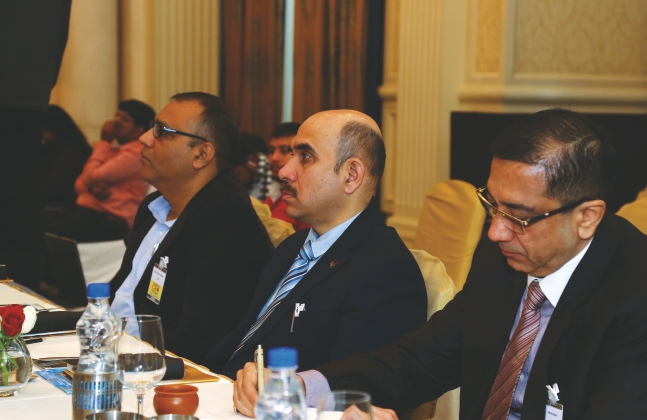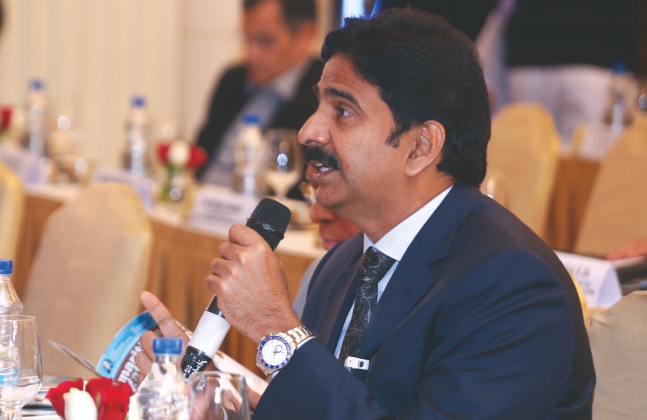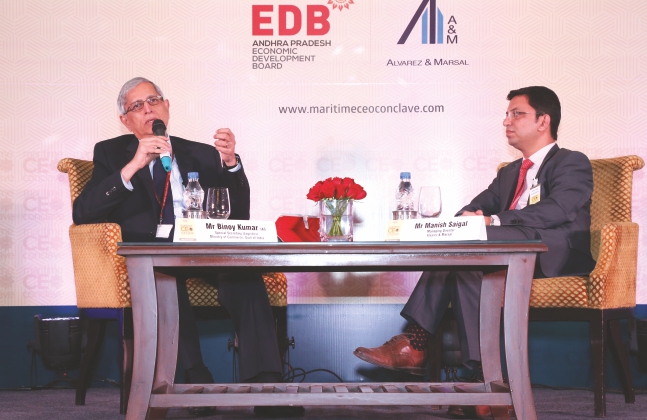The Maritime CEO Conclave’s inaugural session discussed roadmap for reducing logistics cost, and the newly appointed, Special Secretary (Logistics), Ministry of Commerce, Govt of India revealed various reforms and policy changes that is going to take place for the benefit of the sector.
Over a period of four years Maritime CEO Conclave which started with a humble beginning has climbed the ladders of popularity and grew on to one of the most sought after events in the country amid maritime, shipping and logistics industry where top executives congregate and join hands to discuss issues and opportunities that matter the most to the industry. And in the current edition, the forum shifted base from its traditional venue, the city of destiny Visakhapatnam to the national capital. Maritime CEO Conclave is a forum which the industry heavyweights look forward to as the annual event brings together who’s who of maritime, shipping and logistics sector and all come together in the best interest of the sector. The month of January is a time of the year when misty winter is at the peak in Delhi and its neighborhood but it was not a strong enough reason to dampen the enthusiasm and excitement of delegates. On the onset of Maritime CEO Conclave, R Ramprasad, Editor-in-Chief, Maritime Gateway magazine in his introductory remark while welcoming the delegates presented a brief background about 4th Annual Maritime CEO Conclave, and said the event was conceived with the vision to bring together senior management executives and decision makers in the industry to congregate once in a year to brain storm major challenges and opportunities before the industry, and what needs to be done to overcome. The conclave offers an interactive platform to participants. Notably, in the 3rd edition of the conclave at Visakhapatnam in 2017, based upon the suggestion of Michael Pinto, IAS (Retd), former Secretary, Ministry of Shipping, it was decided the Maritime CEO Conclave also needs to include senior bureaucrats and policy makers so that the industry and government can discuss the issues and make the platform more useful and benefi- cial for the industry. Hence in 2018 Maritime CEO Conclave shifted from Visakhapatnam to New Delhi. Around 70 CEOs and senior management executives registered for the Maritime CEO Conclave 2018 that had Alvarez & Marsal as the knowledge partner and was sponsored by APEDB. Setting the tone for the event Ramprasad said that the industry has performed relatively better in 2017 as compared to 2016, and there has been growth in overall cargo movement. In spite of the painful structural reforms that the industry has undergone in the last year, there were three significant developments in the form of implementation of GST; creation of special department for the logistics sector headed by a special secretary; and infrastructure sector status to logistics industry, are some of the decisions which will move the sector in a positive direction and it shows government’s commitment towards logistics industry. Following these developments, the industry is abuzz with lot of investments pouring into the sector from domestic as well as MNC operators, especially for development of hinterland infrastructure such as warehouses, cold storages, multi-modal logistics parks, CFS and ICD, among others. In the recent past, World Bank had forecasted India’s GDP to grow at a rate of about 7.3 per cent in 2018, and the economic growth of the country is going to be much more robust, and backed by the heightened economic activities logistics industry is going to grow at a rate of about 9-10 per cent.
In this background, the theme of Maritime CEO Conclave was Integrated Logistics Infrastructure: Time to Invest. It was divided into four sessions 1) Roadmap for reducing Logistics Cost; 2) Transformation of Customs and trade facilitation; 3) The Changing Dynamics of Distribution Logistics; and 4) Multimodal transportation: Vision of Niti Aayog, and four eminent speakers from the government and public sector entities were engaged in conversation with the moderators along with the involvement of the industry representatives in the way of making suggestions, comments and putting forward questions pertinent to the sector.

Roadmap for reducing Logistics Cost was the topic of discussion in the first session and Binoy Kumar, IAS,
Special Secretary (Logistics), Ministry of Commerce, Govt of India was engaged in conversation with Manish Saigal, Managing Director, Alvarez & Marsal. Adding more insights into the logistics sector, Manish Saigal said that integrated logistics is the need of the hour. After years of dialogue with the government, logistics is getting its due credit and is a major area of focus. Saigal called the attention of the audience on the fact that Indian logistics industry is one of the fastest growing sector in the world now. Even being a US$140 billion sector, the segment was not recognized as a single industry and was split across rail, road and shipping to name a few. At a time when the end users were spending around US$200 billion on logistics, it is important to start thinking the entire gamut of supply chain as one industry. If one draws a comparison between India and other countries, based on the parameters of product GDP in comparison to the scale of the countries such as China and the US, India’s logistics cost is possibly 16.9 per cent cost as a per cent of GDP indexed for product based GDP and indexed for the scale of a country, and this is almost two and half times more than the US and China. It is the reason why all the stake holders need to ponder about logistics as a single industry and its challenges as the shippers in India are paying two and half time more on logistics as compared to his counterparts in the US and China.
There are lot of hopes and aspiration of the logistics industry from the newly appointed Special Secretary (Logistics), under Ministry of Commerce by the government of India, and speaking about the mandate given towards the sector, Binoy Kumar, IAS, Special Secretary (Logistics), Ministry of Commerce, Govt of India said, “The government does feel the need for an integrated approach towards logistics. In July 2017 the government amended the allocation of business rule and added the subject of integrated development of logistics sector as one of the duties of the Department of Commerce, and the post of Special Secretary was created for the purpose.”
Sharing his experience as Director General (Supplies & Disposals), Kumar said that all the Central government office needs were procured by the Director General (Supplies & Disposals), and the process used to take lot of time. Hence, in a bid to procure goods in an efficient and time bound manner Government e-Marketplace (GeM) was developed as a new public procurement platform. Subsequently government felt the need for a logistics marketplace in India, as a result a platform will come very soon. Kumar said logistics is the prime focus of the Government, and all the concerns of the industry will be addressed at the earliest. He added that a very tight deadline has been set by the government for the ministry to address the concerns. The decisions and policies would be made to address logistics challenges in the short and long-run. Kumar summed up that the ministry will work towards creating a single platform that will start looking at the sector in a holistic manner. Talking about the future course of action, Kumar clarified that thereare three things cut out before him to create 1) Action Plan 2) Policy 3) Platform Action.

Answering a question raised by Manish Saigal on various bottlenecks faced by infrastructure developers in executing projects and the need for creation of a single window mechanism where all clearance related to various ministries and departments can be availed, Kumar said that a lot of ground work has been done in the recent past by Ministry of Road Transport and Highways, and Ministry of Shipping with regard to infrastructure, and similar initiatives have been taken up by the Railways. These ministries have conducted lot of studies in this direction and a major challenge before the government is creation of logistics hubs or multi-modal logistics parks. A Cabinet proposal is under consideration on the key areas that should be focused in a logistics park. Kumar stressed that integrated approach towards logistics is the call by the government and platforms like Maritime CEO Conclave is an ideal place to get the feedback. Government is keen on inter-ministerial approach for development of the logistics sector, and an inter-ministerial committee under the chairmanship of Binoy Kumar is working in this direction. Various reviews are being done at the highest level by the government in the interest of logistics sector. Government has set a target to bring down the logistics cost to about 10 per cent.
Answering to a question on the government’s intension in appreciating the concerns of foreign investors in getting the rightful return on their investment, Kumar said that government is working towards making logistics a centre for investment. Committee of Secretaries in its meeting in October, 2017 had decided that certain aspects of logistics sector needs to get infrastructure status, and Ministry of Finance in less than a month’s time granted infrastructure status to the logistics sector. The paper that the committee is working on for the multi-modal logistics parks is more focused on attracting investment than regulating the sector. The Ministry of Commerce is working closely with Ministry of Finance and Department of Economic Affairs to attract investment.
“THE GOVERNMENT DOES FEEL THE NEED FOR AN INTEGRATED APPROACH
TOWARDS LOGISTICS. IN JULY 2017 THE GOVERNMENT AMENDED THE
ALLOCATION OF BUSINESS RULE AND ADDED THE SUBJECT OF INTEGRATED
DEVELOPMENT OF LOGISTICS SECTOR AS ONE OF THE DUTIES OF THE
DEPARTMENT OF COMMERCE, AND THE POST OF SPECIAL SECRETARY WAS
CREATED FOR THE PURPOSE.”
Binoy Kumar, IAS
Special Secretary (Logistics), Ministry of Commerce, Govt of India
Meanwhile, Michael Pinto, IAS (Retd), former Secretary, Ministry of Shipping raised concern about the challenges in bringing down logistics cost, which could make Indian products more competitive globally and in domestic markets. Kumar said that there is a dispute over the logistics cost and a comprehensive study is needed to find out the exact spending on logistics in India. Ministry of Commerce is keen on creating an environment for ease of communication between various departments related to logistics. Anil Yendluri, Director & CEO, Krishnapatnam Port Company brought to the notice of Special Secretary (Logistics) that integrated documentation is not taking place among various departments, and integrated taxation is missing even in post-GST scenario. He stressed on various difficulties due to varied tax slabs, and GST is still seen as product or service linked and not as integrated logistics-linked taxation. Irrespective of players involved in the movement of goods from factory to the destination, there is need for an uniform taxation mechanism for logistics. Clarifying the government’s stand on GST, Kumar said that Multi-modal Transportation of Goods Act which was last amended in 2000, will be soon modified to address the concerns of taxation involving multi-modal transportation of goods. Kumar called the industry to contribute in terms of defining multi-modal model/transport so that there is no ambiguity in fixing taxation for goods moving through this model. Kumar added that work is going on to simplify documentation and processes. Saibal De, Whole Time Director and Chief Executive, IL&FS Maritime Infrastructure Company suggested that various ministries need to have better co-ordination for development of the sector. Anil Devli, CEO, Indian National Shipowners’ Association drew the attention to the fact that while the government found multi-modal shift of cargo from rail to sea is more cost effective but in some cases the Railways in a bid to protect its interest has brought down rail freight rates which has affected the goal for multi-modal logistics.






